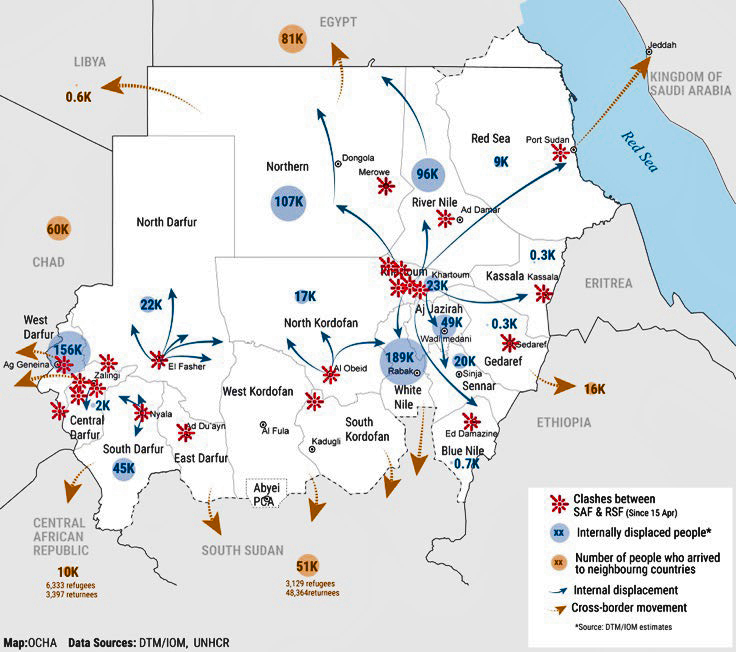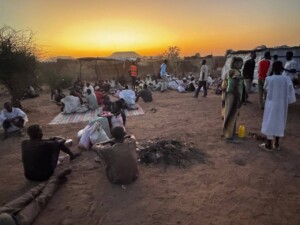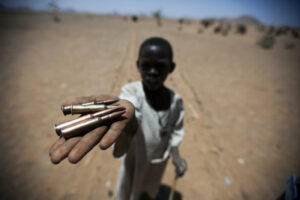OCHA: Sudan humanitarian catastrophe deepens as war rages on

Map showing the humanitarian toll of the conflict in Sudan (Map: OCHA Data Sources: STM/IOM, UNHCR)
KHARTOUM / EL GEZIRA / EL GEDAREF / DARFUR –
The clashes between the Sudan Armed Forces (SAF) and the Rapid Support Forces (RSF) that are now entering their second month, have had devastating consequences for civilians and civilian infrastructure, especially in Khartoum and Darfur. According to Federal Ministry of Health (FMoH) figures on Thursday, the fighting that began on April 15 has left at least 676 people dead, and 5,576 injured, in addition to further casualties from intercommunal violence that erupted in White Nile sates and West Kordofan.
In a flash update on the situation in Sudan released today, the UN Office for the Coordination of Humanitarian Affairs (OCHA) estimates that the conflict has resulted in nearly a million people becoming been either displaced within Sudan or refugees in neighbouring countries.
Among the latest developments from a humanitarian perspective, OCHA confirmed that, as previously reported by Radio Dabanga, a factory that produced vital supplies for the treatment of malnourished children in Sudan was burned down in Khartoum, and that the conflict is threatening the main planting season, while prices of staple goods have risen dramatically, heightening the risk of food insecurity in the period ahead.
“Partners are delivering assistance, including food, therapeutic feeding, and safe learning spaces, to people impacted by the fighting as well as those who were already in need,” the OCHA update says.
The UN Secretary-General, Antonio Guterres, has welcomed the signing by SAF and RSF representatives of the Declaration of Commitment to protect civilians and guarantee the safe passage of humanitarian aid in the country. The declaration signed on 11 May in Jeddah, Kingdom of Saudi Arabia, recognizes the obligations of both sides under international humanitarian and human rights law to facilitate humanitarian action to meet the emergency needs of civilians, and respect humanitarian workers and assets. However, reports of attacks continued and, on 12 May, violence in El Geneina reportedly escalated.
‘Women and children represent over 75 per cent of the secondarily displaced refugees’ – UNHCR
“Over 936,000 people have been newly displaced by the conflict since 15 April, including about 736,200 people displaced internally since the conflict began, and about 200,000 people who have crossed into neighbouring countries, according to the International Organization for Migration (IOM) and the UN refugee agency (UNHCR), respectively. This includes at least 450,000 children who have been forced to flee their homes, including some 368,000 who are internally displaced and 82,000 who have fled to neighbouring countries, according to the UN Children’s Fund (UNICEF). Also, among the displaced are thousands of refugees and asylum seekers who had sought refuge in Sudan before the conflict and who have been displaced once again. Many of these refugees and asylum seekers have arrived in El Gezira and El Gedaref states in search of safety, according to UNHCR. Women and children represent over 75 per cent of the secondarily displaced refugees. Prior to the conflict, there were 3.7 million people internally displaced and 1.1 million refugees and asylum seekers in Sudan.
The ongoing conflict threatens the planting season, which is set to begin at the end of May. If the season is missed, the number of people going hungry will increase. This additional threat to Sudan’s food system will impact women the most, according to CARE. Before the crisis, 42 per cent of households headed by women already had less food compared to 31 per cent of male-headed households, and women are eating less since the conflict began. In addition, prolonged suspension of food assistance is anticipated to increase food insecurity in areas where aid was previously assessed to be preventing worse outcomes—especially in greater Darfur, parts of greater Kordofan and parts of greater Nile—according to FEWS NET, which is reviewing the situation.
Although markets are generally open, prices have increased dramatically for staple goods and there are shortages of imported goods such as wheat flour, oil, and tomato paste, according to a market assessment conducted by Mercy Corps in nine locations across Sudan. In some areas, shops have closed because of insecurity or lack of goods. Access to cash remains a significant issue in Khartoum and South Darfur, while the increase in fuel prices and transportation costs has hindered both daily life and the ability of people to move out of insecure areas.











 and then
and then